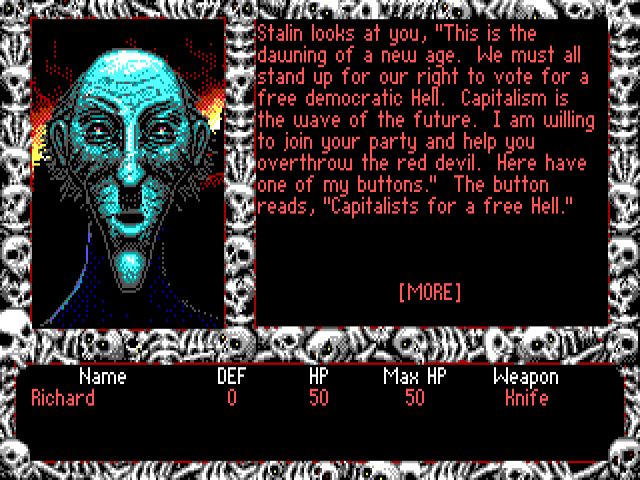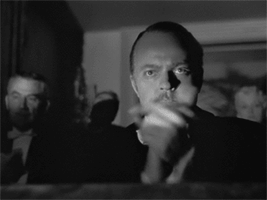Tags: Activision; Electronic Arts; Escape from Hell; Prophecy: The Fall of Trinadon; Retrospective Interview; Richard Seaborne; Tower of Myraglen
This month, January 2015, marks the 25th anniversary of one of the most unique titles in CRPG history, Electronic Arts' 1990 Escape from Hell, designed by Richard L. Seaborne. Imagine something like Wasteland -- a party-, skill-based top-down RPG -- that has you band together with famous historical and literary figures, from Genghis Khan to Hamlet, and explore, literally, the circles of Hell. Along the way, you fight the likes of Al Capone and Satan, learn new skills from Thucydides and Wyatt Earp, among many others, and solve your own and the denizens' problems, which Hell has in spades, with one overarching goal: escaping back to the real world.
As far as CRPG settings go, there has hardly been a more unorthodox one. And the character portraits were fantastic, too.
To celebrate the game's anniversary, we've interviewed Richard Seaborne, who currently works at Microsoft, about Escape from Hell along with two other RPGs he worked on, Tower of Myraglen (1987) for the Apple ][GS and Prophecy: The Fall of Trinadon (1989) for the PC. Here's an excerpt:
Read the full interview for many more details about Richard's games, as well as things like team sizes, D&D modules, nudity warning labels, IBM PC vs Apple ][GS, and Trip Hawkins' and other senior EA people's involvement with Escape.
This month, January 2015, marks the 25th anniversary of one of the most unique titles in CRPG history, Electronic Arts' 1990 Escape from Hell, designed by Richard L. Seaborne. Imagine something like Wasteland -- a party-, skill-based top-down RPG -- that has you band together with famous historical and literary figures, from Genghis Khan to Hamlet, and explore, literally, the circles of Hell. Along the way, you fight the likes of Al Capone and Satan, learn new skills from Thucydides and Wyatt Earp, among many others, and solve your own and the denizens' problems, which Hell has in spades, with one overarching goal: escaping back to the real world.
As far as CRPG settings go, there has hardly been a more unorthodox one. And the character portraits were fantastic, too.
To celebrate the game's anniversary, we've interviewed Richard Seaborne, who currently works at Microsoft, about Escape from Hell along with two other RPGs he worked on, Tower of Myraglen (1987) for the Apple ][GS and Prophecy: The Fall of Trinadon (1989) for the PC. Here's an excerpt:
Prophecy’s spell system was especially interesting. You could memorize up to 10 spells, and also increase their effects, etc. (including making the area of effect larger), by adding the proper prefix to the spell name. What made you go for a system like that?
Prophecy’s spell system was fun to make. I think people really enjoy controlling things where their decisions and actions materially change things in the games they play. And they delight in seeing their creations come to life or even blow up in surprising failure. The magic is that their actions had consequence, and they can get better. I wanted the player to feel like an alchemist that could craft their own magic spells according to consistent rules for any situation, seeing magic as a science they could control once learned.
I imagined players would really like having the ability to “program” their own spells through a spell language that included a prefix power amplifier, effect inverter, and foundational spell function. Spells included implicit properties (fire, ice, poison, harm, heal, etc.) and targeting (individual, missile, area of effect/AOE, etc.). A heal spell could be reversed with an inverter to make the spell harm, and a harm spell could be reversed to heal. Spells had a sense of physics too, so if you cast an AOE spell in too small of a space the blast would ricochet off walls and keep expanding through corridors until its “volume” filled its effect area. Adding the most powerful modifiers to an AOE spell could fill most of the screen with a powerful blast, which might be bad for the player if they were in the path of destruction.
How did Electronic Arts end up publishing Escape from Hell? Were they involved in the process of development, and did they influence the final product in any way?
I had always admired Electronic Arts (EA) for their game quality and innovation, and so pitched the concept of Escape from Hell to them not long after Prophecy had shipped. I learned quite a bit about formal planning and ideation while working with EA. I spent nearly six months of the total 12-month development cycle in pre-production, developing engine technology and tools that would ultimately be the foundation of the game and refining the concept with some of EA’s leaders including Trip Hawkins, Bing Gordon, and Dave Albert. It was during this process that Escape changed from a serious traditional RPG to the contemporary grim comedy RPG.
Perhaps the biggest influence that EA had on Escape from Hell was the business pragmatism of Cost of Goods (COGs) and Return on Investment (ROI). They made the decision to reduce the number of discs the game shipped on in half because retailers demanded the game be available on both 5¼” and 3½” discs. It was an unfortunate time in the industry where many computers had just one disc drive size, and so EA had to ship on both disc sizes. To keep costs down, they required Escape to get a lot smaller so the same COGs would cover both disc types.
You can imagine how that went down in terms of the game’s vision and scope – a lot less character and monster art, 9 circles of Hell collapsed to 3 planes of Hell, time & dimensional shift opportunity reduction, and a lot of loose end tying up with these changes. EA offered a Technical Director to help with compression algorithms to fit as much as possible on the discs and a professional writer to brainstorm and help the narrative be as cohesive as possible within the revised scope.
Escape from Hell was released in January 1990, so that January 2015 marks its 25th anniversary. I'm very interested in the way you feel about the game now. Let me put it this way: what is your first thought whenever the game's name comes up? Retrospectively, are you fully satisfied with what kind of game Escape from Hell turned out to be?
Disappointed. Disheartened. Proud. It’s a bit mixed as you can tell.
Escape shipped and had its place in history. I firmly believe it would have been better if it hadn’t had its media budget cut in half, forcing it to miss out on all Nine Circles of Hell, signature art for key characters, more demons, monsters, & gear, and more map & script variances according to player actions, party members, and Trident time control. On the other hand, I am proud to have contributed to the early era of CRPG’s, influencing a lot of features, design tenants, and concepts in many games over these twenty-five years.
Prophecy’s spell system was fun to make. I think people really enjoy controlling things where their decisions and actions materially change things in the games they play. And they delight in seeing their creations come to life or even blow up in surprising failure. The magic is that their actions had consequence, and they can get better. I wanted the player to feel like an alchemist that could craft their own magic spells according to consistent rules for any situation, seeing magic as a science they could control once learned.
I imagined players would really like having the ability to “program” their own spells through a spell language that included a prefix power amplifier, effect inverter, and foundational spell function. Spells included implicit properties (fire, ice, poison, harm, heal, etc.) and targeting (individual, missile, area of effect/AOE, etc.). A heal spell could be reversed with an inverter to make the spell harm, and a harm spell could be reversed to heal. Spells had a sense of physics too, so if you cast an AOE spell in too small of a space the blast would ricochet off walls and keep expanding through corridors until its “volume” filled its effect area. Adding the most powerful modifiers to an AOE spell could fill most of the screen with a powerful blast, which might be bad for the player if they were in the path of destruction.
How did Electronic Arts end up publishing Escape from Hell? Were they involved in the process of development, and did they influence the final product in any way?
I had always admired Electronic Arts (EA) for their game quality and innovation, and so pitched the concept of Escape from Hell to them not long after Prophecy had shipped. I learned quite a bit about formal planning and ideation while working with EA. I spent nearly six months of the total 12-month development cycle in pre-production, developing engine technology and tools that would ultimately be the foundation of the game and refining the concept with some of EA’s leaders including Trip Hawkins, Bing Gordon, and Dave Albert. It was during this process that Escape changed from a serious traditional RPG to the contemporary grim comedy RPG.
Perhaps the biggest influence that EA had on Escape from Hell was the business pragmatism of Cost of Goods (COGs) and Return on Investment (ROI). They made the decision to reduce the number of discs the game shipped on in half because retailers demanded the game be available on both 5¼” and 3½” discs. It was an unfortunate time in the industry where many computers had just one disc drive size, and so EA had to ship on both disc sizes. To keep costs down, they required Escape to get a lot smaller so the same COGs would cover both disc types.
You can imagine how that went down in terms of the game’s vision and scope – a lot less character and monster art, 9 circles of Hell collapsed to 3 planes of Hell, time & dimensional shift opportunity reduction, and a lot of loose end tying up with these changes. EA offered a Technical Director to help with compression algorithms to fit as much as possible on the discs and a professional writer to brainstorm and help the narrative be as cohesive as possible within the revised scope.
Escape from Hell was released in January 1990, so that January 2015 marks its 25th anniversary. I'm very interested in the way you feel about the game now. Let me put it this way: what is your first thought whenever the game's name comes up? Retrospectively, are you fully satisfied with what kind of game Escape from Hell turned out to be?
Disappointed. Disheartened. Proud. It’s a bit mixed as you can tell.
Escape shipped and had its place in history. I firmly believe it would have been better if it hadn’t had its media budget cut in half, forcing it to miss out on all Nine Circles of Hell, signature art for key characters, more demons, monsters, & gear, and more map & script variances according to player actions, party members, and Trident time control. On the other hand, I am proud to have contributed to the early era of CRPG’s, influencing a lot of features, design tenants, and concepts in many games over these twenty-five years.
Read the full interview for many more details about Richard's games, as well as things like team sizes, D&D modules, nudity warning labels, IBM PC vs Apple ][GS, and Trip Hawkins' and other senior EA people's involvement with Escape.







![Have Many Potato [2013] Codex 2013](/forums/smiles/campaign_tags/campaign_potato2013.png)
![The Year of Incline [2014] Codex 2014](/forums/smiles/campaign_tags/campaign_incline2014.png)
















![Glory to Codexia! [2012] Codex 2012](/forums/smiles/campaign_tags/campaign_slushfund2012.png)




 This is why the Codex is The Prestigious Magazine/Forum!!!
This is why the Codex is The Prestigious Magazine/Forum!!!










